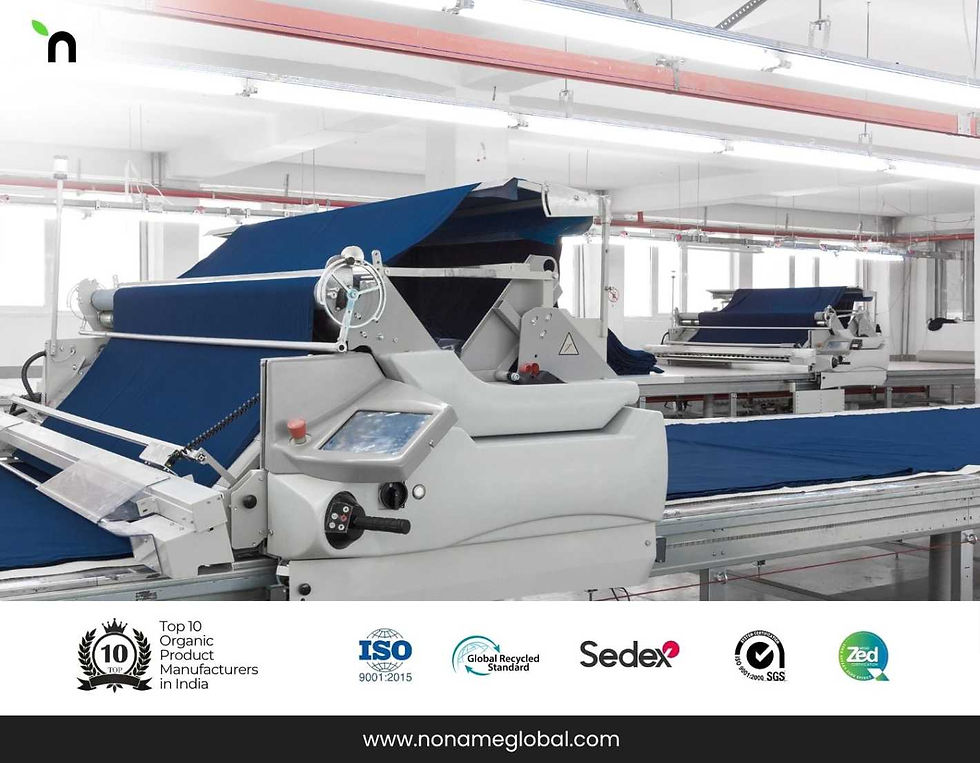Why Sustainable Practices Are Essential in Modern Garment Production
- designcelestialfix
- Jun 24, 2025
- 5 min read
Updated: Jul 17, 2025
Summary:
Sustainable practices in garment production are no longer optional—they’re the future. This blog explains why they matter, how they help your brand grow, and what steps you can take today. If you're a fashion retailer looking to cut waste, boost reputation, and stay ahead, this guide is your quick start to doing it the right way.
Introduction:
“Every second, a truckload of textiles is dumped in landfills or incinerated.” This chilling fact from the Ellen MacArthur Foundation highlights a stark reality: fashion is beautiful, but the way it’s produced often isn’t.
The garment production industry is a vital part of the global economy. However, it is also one of the most polluting sectors. With the increasing awareness of climate change and environmental issues, sustainable practices have emerged as a crucial solution. These practices not only benefit the environment but also contribute to better business outcomes.

Implementing sustainable practices in garment production is not just a choice; it is a necessity. For fashion retailers, this shift presents a powerful opportunity to build a brand that today’s conscious consumers trust and that tomorrow’s world needs.
Let’s explore why sustainable practices in garment production are vital, how they benefit both planet and profit, and what fashion retailers can do today to future-proof their brand.
Understanding Sustainable Practices
Sustainable practices in garment production refer to methods that reduce environmental damage and uphold ethical standards throughout the lifecycle of a garment. This includes:
Using organic or recycled materials
Minimizing water, chemical, and energy use
Ensuring fair labor practices
Reducing textile waste and overproduction
A 2023 report by McKinsey revealed that 67% of global consumers consider sustainable materials a deciding factor when buying clothing. For fashion retailers, this is a clear sign: integrating sustainable practices is not just about ethics, it’s about market demand.
For example, switching to organic cotton instead of conventional cotton significantly reduces water use and eliminates pesticide runoff. While traditional cotton consumes around 2,700 liters of water for one shirt, organic cotton can reduce that by more than 90%, according to the Soil Association.
When sustainable practices in garment production are adopted from the ground up, fashion brands benefit from cleaner processes, happier customers, and stronger long-term business health.
The Need for Sustainable Practices in Garment Production
The garment industry is one of the most resource-intensive industries on the planet. Let’s break down the urgency:
10% of global carbon emissions come from fashion (World Bank)
20% of industrial water pollution is attributed to textile dyeing and treatment (UNESCO)
The average consumer today buys 60% more clothes than 15 years ago, yet keeps them for half as long (McKinsey)
These statistics underscore the critical need for sustainable practices in garment production. If the fashion industry continues at its current pace, emissions will increase by 50% by 2030.
Beyond environmental damage, fast fashion has led to unsafe working conditions, wage exploitation, and excessive waste. Consumers, especially Millennials and Gen Z, are more aware than ever. A 2024 study by First Insight shows that 73% of Gen Z are willing to pay more for sustainable fashion.
That means fashion retailers who ignore sustainability risk losing relevance, revenue, and reputation.
But those who lead with sustainable practices in garment production can position themselves as pioneers of a new, responsible fashion era.

Benefits of Implementing Sustainable Practices
Investing in sustainable practices in garment production delivers more than feel-good branding. Here are some compelling business benefits:
🌱 Enhanced Brand Reputation
Retailers that champion sustainable fashion build trust with conscious shoppers. Brands like Patagonia, Stella McCartney, and Allbirds have turned their sustainability mission into customer loyalty engines.
By aligning with sustainable clothing manufacturers in India or globally, you show that your brand walks the talk.
📈 Compliance & Future-Proofing
More governments are introducing regulations on carbon emissions, textile waste, and labor conditions. By implementing sustainable practices in garment production now, you stay ahead of changing laws and avoid penalties.
💰 Cost Savings in the Long Run
Sustainability doesn’t always mean higher costs. In fact, energy-efficient dyeing, digital printing, and lean production systems can lower energy bills and reduce fabric waste. Even closed-loop water systems in dyeing units are reducing costs by up to 60% for some factories.
🤝 Attracting Investors & Partners
Retailers with a transparent, responsible supply chain are increasingly favored by investors, B2B buyers, and platforms like Zalando or Farfetch, which have strict sustainability onboarding guidelines.
The benefits of sustainable practices in garment production go far beyond environmental goodwill, they directly impact your bottom line and brand growth.

Practical Steps Toward Sustainability
For fashion retailers ready to act, here’s how to integrate sustainable practices in garment production into your brand DNA:
1. Adopt Eco-Friendly Materials
Choose fabrics like:
Organic cotton
Bamboo viscose
Recycled polyester (made from PET bottles)
TENCEL™, Hemp, and Banana fabric
These reduce environmental damage, are biodegradable, and appeal to eco-conscious consumers.
2. Optimize Manufacturing Processes
Work with a clothing manufacturer in India that uses:
Waterless dyeing methods
Renewable energy sources
Digital pattern-making to reduce fabric wastage
3. Implement Supply Chain Transparency
Modern consumers want to know where and how their clothes were made. Collaborate with manufacturers that provide traceability reports and certifications like GOTS, Fair Trade, and OEKO-TEX®.
4. Educate Staff & Customers
Sustainability is a journey. Train your team and inform your audience about your goals. Use your website, tags, and packaging to share your story and progress.
5. Set Clear Sustainability Goals
Track metrics like water usage, waste generated, and percentage of recycled materials. Publicly sharing your results boosts credibility and trust.
The Best Sustainable Clothing Manufacturer in India
If you're searching for a sustainable clothing manufacturer in India who can truly support your mission, look no further than NoName.
NoName is a pioneer in sustainable practices in garment production, combining cutting-edge technology with traditional craftsmanship. From sourcing organic fabrics to using renewable energy, NoName ensures that every garment is made with minimal environmental impact and maximum attention to quality.
Here’s what makes NoName stand out:
Flexi MOQ system, perfect for small and mid-sized brands testing new sustainable collections.
Use of Kooltex, organic cotton, and recycled polyester for breathable, eco-friendly clothing.
Ethical labor practices and a transparent production model.
Expertise in private-label manufacturing, allowing retailers to scale sustainably with full customization.
Whether you're launching a conscious fashion line or upgrading your existing supply chain, NoName is the trusted clothing manufacturer in India to bring your sustainable vision to life.
The Future of Garment Production
The future of fashion is digital, ethical, and sustainable. Innovations like:
3D virtual sampling
AI-driven inventory planning
Blockchain-based supply chain transparency. They are already transforming how garments are designed, made, and sold.
According to Business of Fashion’s 2025 Outlook, 65% of global fashion brands plan to increase investment in sustainable practices, with circular fashion, resale models, and digital twins leading the charge.
Fashion retailers who embrace sustainable practices in garment production now will be the brands that thrive in this new era.
Final Thoughts
The global fashion industry stands at a crossroads. On one side: outdated, wasteful production that pollutes our planet. On the other hand: innovation, ethics, and sustainability.
Fashion retailers have a powerful role to play in this transformation.
By choosing sustainable practices in garment production, you don’t just help the planet, you win the trust of modern consumers, comply with regulations, cut costs, and future-proof your brand.
The choice is clear, and the time is now.
🌿 Ready to make the shift?
Partner with NoName, the most trusted sustainable clothing manufacturer in India, to build your next collection the responsible way.
Let’s co-create a greener, cleaner fashion industry, one garment at a time.
📩 Contact NoName today to begin your sustainable production journey.
WhatsApp: +91-9717 508 508
Email: hello@nonameglobal.com
Website: www.nonameglobal.com
Online meeting: https://calendly.com/nonameglobal/meet














Comments